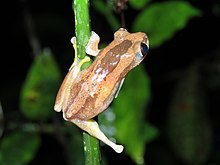Afrixalus osorioi is a species of frog in the family Hyperoliidae.[1][2][3] It is found in Angola, Democratic Republic of the Congo, Gabon, western Kenya, and Uganda.[1] The specific name osorioi honours Balthazar Osório, a Portuguese ichthyologist.[4] Its common names include Angola banana frog, Osorio's spiny reed frog, Congro spiny reed frog, and forest tree frog.[1][2]
| Afrixalus osorioi | |
|---|---|

| |
| Scientific classification | |
| Domain: | Eukaryota |
| Kingdom: | Animalia |
| Phylum: | Chordata |
| Class: | Amphibia |
| Order: | Anura |
| Family: | Hyperoliidae |
| Genus: | Afrixalus |
| Species: | A. osorioi
|
| Binomial name | |
| Afrixalus osorioi (Ferreira, 1906)
| |
| Synonyms[2] | |
| |
Description
editAdult males measure around 27–31 mm (1.1–1.2 in) and adult females 32–35 mm (1.3–1.4 in) in snout–vent length. They have a light and dark brown dorsal pattern that normally include a rectangular dark dorsal spot and which extends to the anus. Males have small, scattered, and inconspicuous asperities on the dorsal surfaces of head, body, and limbs. The tibia have light upper side.[3]
The male advertisement call consists of a series of clicks emitted at a rate of 18–30 per second.[3]
Habitat and conservation
editAfrixalus osorioi occurs in degraded secondary forests and heavily degraded former forests (including farm bush) of the central African rainforest belt. Breeding takes place in small temporary and permanent water bodies with overhanging vegetation. They also use artificial water bodies such as old drums. It is an abundant and adaptable species that is unlikely to face significant threats. It occurs in several protected areas.[1]
References
edit- ^ a b c d e IUCN SSC Amphibian Specialist Group (2016). "Afrixalus osorioi". IUCN Red List of Threatened Species. 2016: e.T56073A18370096. doi:10.2305/IUCN.UK.2016-1.RLTS.T56073A18370096.en. Retrieved 17 November 2021.
- ^ a b c Frost, Darrel R. (2018). "Afrixalus osorioi (Ferreira, 1906)". Amphibian Species of the World: an Online Reference. Version 6.0. American Museum of Natural History. Retrieved 10 July 2018.
- ^ a b c "Afrixalus osorioi Osorio's Spiny Reed Frog". AmphibiaWeb. University of California, Berkeley. 2008. Retrieved 10 July 2018.
- ^ Beolens, Bo; Watkins, Michael & Grayson, Michael (2013). The Eponym Dictionary of Amphibians. Pelagic Publishing. p. 159. ISBN 978-1-907807-42-8.
